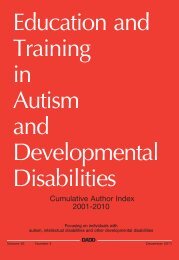Download the Journal (PDF) - Division on Autism and ...
Download the Journal (PDF) - Division on Autism and ...
Download the Journal (PDF) - Division on Autism and ...
You also want an ePaper? Increase the reach of your titles
YUMPU automatically turns print PDFs into web optimized ePapers that Google loves.
Educati<strong>on</strong> <strong>and</strong> Training in Developmental Disabilities, 2008, 43(3), 342–359<br />
© <str<strong>on</strong>g>Divisi<strong>on</strong></str<strong>on</strong>g> <strong>on</strong> Developmental Disabilities<br />
Systematic Instructi<strong>on</strong> for Social-Pragmatic Language Skills in<br />
Lunchroom Settings<br />
Maureen E. Angell, Rita L. Bailey, <strong>and</strong> Laura Lars<strong>on</strong><br />
Illinois State University<br />
Abstract: This study involved <str<strong>on</strong>g>the</str<strong>on</strong>g> extensi<strong>on</strong> <strong>and</strong> adaptati<strong>on</strong> of systematic instructi<strong>on</strong>al procedures suggested by<br />
Light <strong>and</strong> Binger (1998) to increase <str<strong>on</strong>g>the</str<strong>on</strong>g> social-pragmatic language skills of five high school students with<br />
moderate cognitive disabilities. Within a single-subject multiple probe research design, we also assessed<br />
interventi<strong>on</strong> effects <strong>on</strong> two skills targeted by classroom teachers. The three primary target behaviors were taking<br />
obligatory turns, taking n<strong>on</strong>obligatory turns, <strong>and</strong> asking partner-focused questi<strong>on</strong>s. The two sec<strong>on</strong>dary target<br />
behaviors were c<strong>on</strong>versing with appropriate eye c<strong>on</strong>tact <strong>and</strong> using appropriate t<strong>on</strong>e of voice in c<strong>on</strong>versati<strong>on</strong>al<br />
speech. Overall, results showed positive effects of <str<strong>on</strong>g>the</str<strong>on</strong>g> interventi<strong>on</strong> <strong>on</strong> participants’ skills with some variability in<br />
student performance in generalizati<strong>on</strong> (lunchroom) settings. Fur<str<strong>on</strong>g>the</str<strong>on</strong>g>r research <strong>on</strong> <str<strong>on</strong>g>the</str<strong>on</strong>g> effects of various systematic<br />
instructi<strong>on</strong>al strategies <strong>on</strong> <str<strong>on</strong>g>the</str<strong>on</strong>g> social-pragmatic skills of individuals with various disabilities in multiple settings<br />
is recommended.<br />
Students with disabilities, particularly those requiring<br />
augmentative <strong>and</strong> alternative communicati<strong>on</strong><br />
(AAC) systems, often have difficulty<br />
participating in social communicati<strong>on</strong> exhanges<br />
(Furick, 2003; Hatt<strong>on</strong>, 1998). Successful<br />
communicati<strong>on</strong> exchanges in social envir<strong>on</strong>ments<br />
involve competent use of language,<br />
or pragmatic language skills. Pragmatic language<br />
skills have been described as <str<strong>on</strong>g>the</str<strong>on</strong>g> use of<br />
communicati<strong>on</strong> to carry out communicati<strong>on</strong><br />
interacti<strong>on</strong>s in a social envir<strong>on</strong>ment (Levins<strong>on</strong>,<br />
1983). Pragmatics has been defined as<br />
“rules for using language c<strong>on</strong>textually for social<br />
purposes” (Beukelman & Mirenda, 1998,<br />
p. 332). Knowledge <strong>and</strong> skills related to interpreting<br />
<strong>and</strong> sending appropriate n<strong>on</strong>verbal<br />
messages (i.e., eye c<strong>on</strong>tact, facial expressi<strong>on</strong>s,<br />
<strong>and</strong> body language) are also required for competent<br />
use of pragmatic language. Development<br />
<strong>and</strong> use of appropriate social <strong>and</strong> pragmatic<br />
language skills is important to<br />
maximizing <str<strong>on</strong>g>the</str<strong>on</strong>g> quality of life of students with<br />
intellectual disabilities. Appropriate communicati<strong>on</strong><br />
interacti<strong>on</strong>s am<strong>on</strong>g peers with <strong>and</strong><br />
Corresp<strong>on</strong>dence c<strong>on</strong>cerning this article should<br />
be addressed to Maureen E. Angell, Illinois State<br />
University, Department of Special Educati<strong>on</strong>, Campus<br />
Box 5910, Normal, IL 61790-5910.<br />
342 / Educati<strong>on</strong> <strong>and</strong> Training in Developmental Disabilities-September 2008<br />
without disabilities are important for developing<br />
meaningful relati<strong>on</strong>ships.<br />
Unfortunately, students with intellectual<br />
disabilities often experience difficulties in interacting<br />
successfully with peers (DeGeorge,<br />
1998). According to <str<strong>on</strong>g>the</str<strong>on</strong>g> Nati<strong>on</strong>al Joint Committee<br />
<strong>on</strong> Learning Disabilities (1998), people<br />
with intellectual disabilities often dem<strong>on</strong>strate<br />
problems in self-regulatory behaviors, social<br />
percepti<strong>on</strong>s, <strong>and</strong> social <strong>and</strong> pragmatic interacti<strong>on</strong>s.<br />
The development of appropriate sociorelati<strong>on</strong>al<br />
skills plays a key role in <str<strong>on</strong>g>the</str<strong>on</strong>g> development<br />
of communicative competence<br />
(Light, Binger, Agate, & Ramsay, 1999). This<br />
may be a particularly important skill for<br />
school-age children, as behavior <strong>and</strong> communicati<strong>on</strong><br />
patterns developed during <str<strong>on</strong>g>the</str<strong>on</strong>g> school<br />
years may impact students’ ability to form <strong>and</strong><br />
maintain relati<strong>on</strong>ships <strong>and</strong> friendships for a<br />
lifetime.<br />
Making friends is a natural result of human<br />
interacti<strong>on</strong> that involves many complex verbal<br />
<strong>and</strong> n<strong>on</strong>verbal transacti<strong>on</strong>s (DeGeorge,<br />
1998). Impaired development of social <strong>and</strong><br />
pragmatic language skills may negatively affect<br />
<str<strong>on</strong>g>the</str<strong>on</strong>g> forging of friendships between students<br />
with <strong>and</strong> without disabilities. Typical interacti<strong>on</strong>s<br />
between peers with <strong>and</strong> without disabilities<br />
have been reported as ‘asymmetrical’<br />
with more of <str<strong>on</strong>g>the</str<strong>on</strong>g> communicati<strong>on</strong> resp<strong>on</strong>sibil-
















